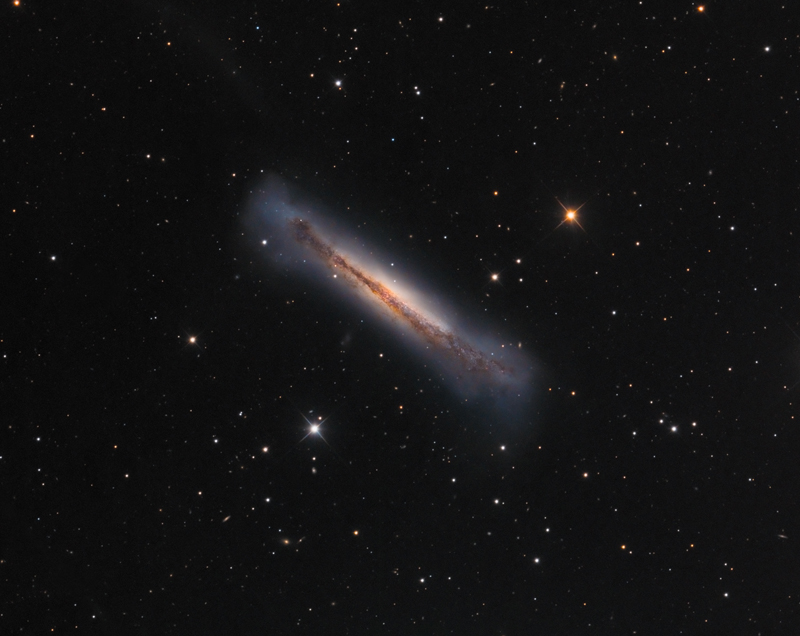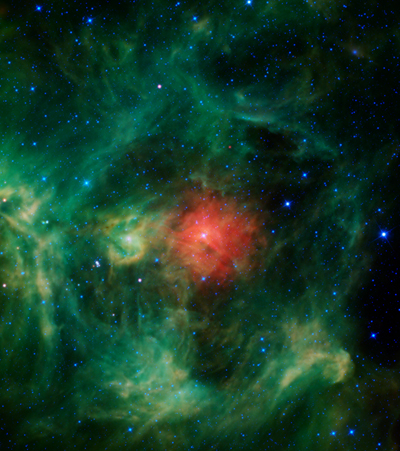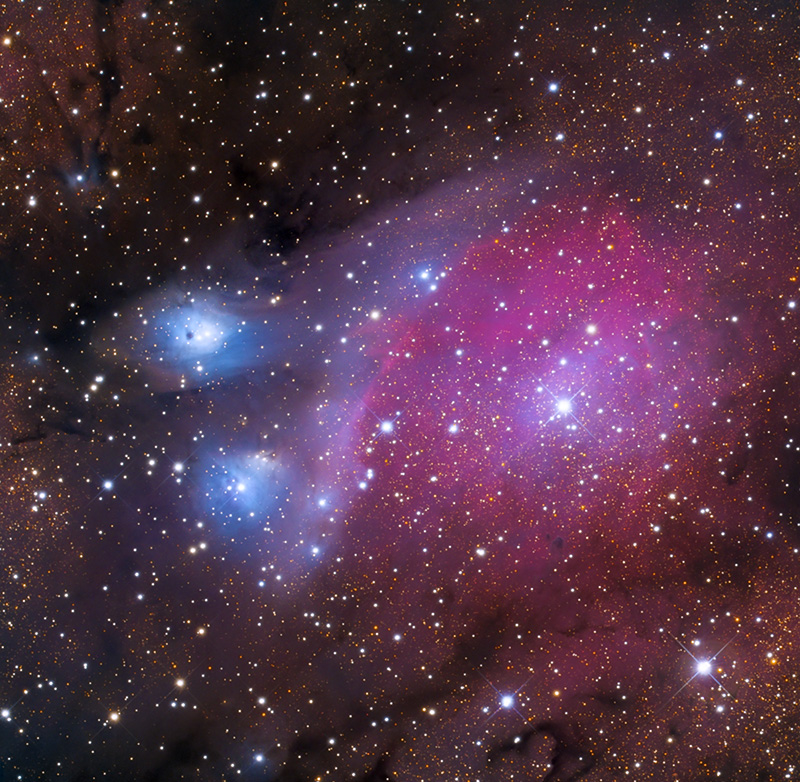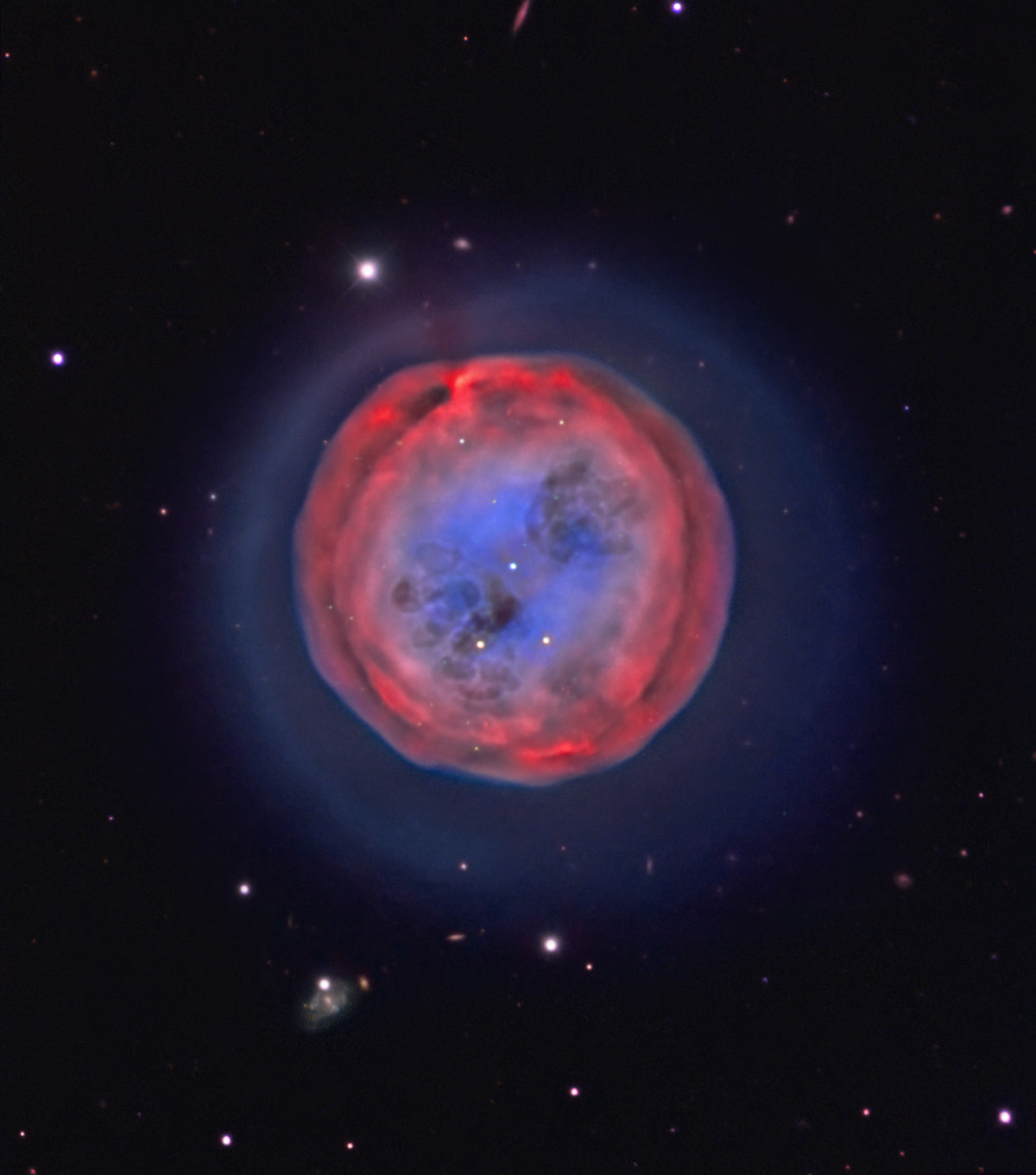Found Images: 2013 May
Found Images: 2013 May
Have you seen a great image or video somewhere that you think would make a great APOD? Nominate it for APOD! Please post as much information here as you have about the image/video with a link to any source(s) for it you know of here, and the editors will take a look.
When posting the image itself, please do not post anything larger than a thumbnail here; please honor the copyright holder's copyright.
Please keep images under 400K, whether hotlinked or uploaded.
Thank you!
<- Previous
A closed mouth gathers no foot.
-
starsurfer
- Stellar Cartographer
- Posts: 5409
- Joined: Thu Mar 15, 2012 7:25 pm
Re: Found Images: 2013 May
-
starsurfer
- Stellar Cartographer
- Posts: 5409
- Joined: Thu Mar 15, 2012 7:25 pm
Re: Found Images: 2013 May
PK 164+31.1
http://www.astroanarchy.blogspot.co.uk/ ... inues.html
Copyright: J-P Metsävainio This image shows a previously unknown halo that has been confirmed by professional astronomers!!
http://www.astroanarchy.blogspot.co.uk/ ... inues.html
Copyright: J-P Metsävainio This image shows a previously unknown halo that has been confirmed by professional astronomers!!
- MargaritaMc
- Look to the Evenstar
- Posts: 1836
- Joined: Wed Jan 09, 2013 10:14 pm
- Location: 28°16'7"N 16°36'20"W
Re: Found Images: 2013 May

- The Danish 1.54-meter telescope located at ESO's La Silla Observatory in Chile has captured a striking image of NGC 6559, an object that showcases the anarchy that reigns when stars form inside an interstellar cloud. This region of sky includes glowing red clouds of mostly hydrogen gas, blue regions where starlight is being reflected from tiny particles of dust and also dark regions where the dust is thick and opaque. Credit: ESO. Usage Restrictions: None
http://www.eso.org/public/news/eso1320/
I'm proposing this as an Apod because I, myself, still a relative newcomer to the study of astronomy, found this image and the accompanying text to be helpful, especially in showing (and explaining) an emission nebula next to a reflection nebula.An Anarchic Region of Star Formation
2 May 2013
The Danish 1.54-metre telescope located at ESO’s La Silla Observatory in Chile has captured a striking image of NGC 6559, an object that showcases the anarchy that reigns when stars form inside an interstellar cloud.
NGC 6559 is a cloud of gas and dust located at a distance of about 5000 light-years from Earth, in the constellation of Sagittarius (The Archer). The glowing region is a relatively small object, just a few light-years across, in contrast to the one hundred light-years and more spanned by its famous neighbour, the Lagoon Nebula (Messier 8, eso0936). Although it is usually overlooked in favour of its distinguished companion, NGC 6559 has the leading role in this new picture.
The gas in the clouds of NGC 6559, mainly hydrogen, is the raw material for star formation. When a region inside this nebula gathers enough matter, it starts to collapse under its own gravity. The centre of the cloud grows ever denser and hotter, until thermonuclear fusion begins and a star is born. The hydrogen atoms combine to form helium atoms, releasing energy that makes the star shine.
These brilliant hot young stars born out of the cloud energise the hydrogen gas still present around them in the nebula [1]. The gas then re-emits this energy, producing the glowing threadlike red cloud seen near the centre of the image. This object is known as an emission nebula.
But NGC 6559 is not just made out of hydrogen gas. It also contains solid particles of dust, made of heavier elements, such as carbon, iron or silicon. The bluish patch next to the red emission nebula shows the light from the recently formed stars being scattered — reflected in many different directions — by the microscopic particles in the nebula. Known to astronomers as a reflection nebula, this type of object usually appears blue because the scattering is more efficient for these shorter wavelengths of light [2].
In regions where it is very dense, the dust completely blocks the light behind it, as is the case for the dark isolated patches and sinuous lanes to the bottom left-hand side and right-hand side of the image. To look through the clouds at what lies behind, astronomers would need to observe the nebula using longer wavelengths that would not be absorbed.
The Milky Way fills the background of the image with countless yellowish older stars. Some of them appear fainter and redder because of the dust in NGC 6559.
This eye-catching image of star formation was captured by the Danish Faint Object Spectrograph and Camera (DFOSC) on the 1.54-metre Danish Telescope at La Silla in Chile. This national telescope has been in use at La Silla since 1979 and was recently refurbished to turn it into a remote-controlled state-of-the-art telescope.
Notes
[1] These young stars are usually of spectral type O and B, with temperatures between 10 000 and 60 000 K, which radiate huge amounts of high energy ultraviolet light that ionises the hydrogen atoms.
[2] Rayleigh scattering, named after the British physicist Lord Rayleigh, happens when light is scattered off particles of material that are much smaller than the wavelength of the light. It is much more effective for short wavelengths of light, that is, wavelengths corresponding to the blue end of the visible spectrum, so the result is a bluish diffuse light. This is the same mechanism that explains the blue colour of the daytime cloud-free sky.
Margarita
"In those rare moments of total quiet with a dark sky, I again feel the awe that struck me as a child. The feeling is utterly overwhelming as my mind races out across the stars. I feel peaceful and serene."
— Dr Debra M. Elmegreen, Fellow of the AAAS
-
starsurfer
- Stellar Cartographer
- Posts: 5409
- Joined: Thu Mar 15, 2012 7:25 pm
Re: Found Images: 2013 May
NGC 3314
http://hubblesite.org/newscenter/archiv ... s/2012/29/
Copyright: NASA, ESA, the Hubble Heritage Team (STScI/AURA)-ESA/Hubble Collaboration, and W. Keel (University of Alabama)
http://hubblesite.org/newscenter/archiv ... s/2012/29/
Copyright: NASA, ESA, the Hubble Heritage Team (STScI/AURA)-ESA/Hubble Collaboration, and W. Keel (University of Alabama)
-
starsurfer
- Stellar Cartographer
- Posts: 5409
- Joined: Thu Mar 15, 2012 7:25 pm
Re: Found Images: 2013 May
-
starsurfer
- Stellar Cartographer
- Posts: 5409
- Joined: Thu Mar 15, 2012 7:25 pm
Re: Found Images: 2013 May
M86
http://www.astro-koop.de/?attachment_id=1075
Copyright: Stefan Heutz, Wolfgang Ries and Michael Breite
http://www.astro-koop.de/?attachment_id=1075
Copyright: Stefan Heutz, Wolfgang Ries and Michael Breite
-
starsurfer
- Stellar Cartographer
- Posts: 5409
- Joined: Thu Mar 15, 2012 7:25 pm
Re: Found Images: 2013 May
Re: Found Images: 2013 May
Hooray!!! There's a new, splendid galaxy image by Adam Block! I don't know how to make the picture smaller, so I can only post it as a link.
The galaxies in the picture are NGC 4490 and NGC 4485. Note how blue they are, and how peppered with red emission nebulae!






Ann
The galaxies in the picture are NGC 4490 and NGC 4485. Note how blue they are, and how peppered with red emission nebulae!
Ann
Last edited by bystander on Thu May 09, 2013 9:55 pm, edited 2 times in total.
Reason: added image from web page
Reason: added image from web page
Color Commentator
-
starsurfer
- Stellar Cartographer
- Posts: 5409
- Joined: Thu Mar 15, 2012 7:25 pm
Re: Found Images: 2013 May
Re: Found Images: 2013 May
Destination Earth
ESA Space Science | 2013 May 06
ESA Space Science | 2013 May 06
Solar science meets art in this unique portrait of a solar storm heading straight for Earth.
The image is based on data collected by the ESA/NASA SOHO space observatory during a coronal mass ejection, when a huge cloud of magnetised plasma was ejected from the Sun’s atmosphere and launched towards Earth.
The image shows an extreme-ultraviolet view of the solar disc superimposed on a wide-field view of the surrounding solar environment as the storm leaps away from the Sun.
Two particularly bright regions on the Sun’s face indicate active regions with looping magnetic fields. Towards the left a filament of dense, cool gas appears to snake its way across the surface.
As a result of the ‘running difference’ technique used to process the images, the scene creates a feeling of rapid change as the solar storm expands outwards on all sides of the Sun and races towards us.
The running difference technique takes sequential snapshots and compares them such that the strongest and most persistent features are isolated and highlighted.
Note that the solar disc is not to scale with the background image. SOHO images are usually shown with a gap of around 3 solar radii from the edge of the Sun’s disc, with an occulter blocking out the intense light from the Sun in order to reveal the faint details of the corona.
Coronal mass ejections like the one portrayed here blast away billions of tonnes of matter from the Sun at millions of kilometres per hour. By the time this particular event engulfed Earth two days later, the eruption was some 50 million kilometres wide.
This image featured in a SOHO ‘The Sun as Art’ portfolio in 2002.
Know the quiet place within your heart and touch the rainbow of possibility; be
alive to the gentle breeze of communication, and please stop being such a jerk. — Garrison Keillor
alive to the gentle breeze of communication, and please stop being such a jerk. — Garrison Keillor
Re: Found Images: 2013 May
Sunrise Over the South Pacific Ocean
NASA IOTD | 2013 May 09
NASA IOTD | 2013 May 09
The sun is about to come up over the South Pacific Ocean in this colorful scene photographed by one of the Expedition 35 crew members aboard the Earth-orbiting International Space Station between 4 and 5 a.m. local time, May 5, 2013.
The space station was at a point above Earth located at 27.4 degrees south latitude and 110.1 degrees west longitude, a few hundred miles east of Easter Island.
Image Credit: NASA
Know the quiet place within your heart and touch the rainbow of possibility; be
alive to the gentle breeze of communication, and please stop being such a jerk. — Garrison Keillor
alive to the gentle breeze of communication, and please stop being such a jerk. — Garrison Keillor
-
starsurfer
- Stellar Cartographer
- Posts: 5409
- Joined: Thu Mar 15, 2012 7:25 pm
Re: Found Images: 2013 May
Sagittarius A*
http://herschel.cf.ac.uk/results/sagittarius-a-star
Copyright: ESA/Herschel/PACS & SPIRE/J.R. Goicoechea et al. (2013)
http://herschel.cf.ac.uk/results/sagittarius-a-star
Copyright: ESA/Herschel/PACS & SPIRE/J.R. Goicoechea et al. (2013)
Annular Solar Eclipse: 2013 May 10
Solar Eclipse's Shadow on Earth
On May 10, 2013, the sun experienced what's called an annular eclipse -- when the moon moves directly in front of the sun, but doesn't obscure it completely. This leaves a thin, fiery ring, the annulus, visible around the outside. This eclipse was only visible from the South Pacific, along an approximately 100-mile-wide track that traverses Australia, Papua New Guinea, the Solomon Islands and the Gilbert Islands. Other areas in Australia and Indonesia saw a partial eclipse, in which the moon blocks a much smaller region of the sun.
NASA's Terra satellite didn't observe the eclipse directly, but it did see the moon's shadow darkening the region northeast of Australia including the Solomon Islands. This image was captured by Terra's Moderate Resolution Imaging Spectroradiometer on May 9, 2013, at 23:30 UTC (7:30 p.m. EDT).
Credit: NASA/Goddard/MODIS Rapid Response Team
› More about the May 2013 annular eclipse
Japan’s MTSAT-2 (also known as Himawari-7) collected these images of today’s annular solar eclipse from geostationary orbit. The satellite (similar to the United State’s GOES satellites), observed the moon’s shadow as it passed over Australia & the Pacific Ocean. The image sequence begins at 21:32 UTC, with an additional image each hour until 02:32 UTC. The eclipse itself lasted from 22:33 UTC until 02:20 UTC.
Source: NASA Earth Observatory
NASA's Terra satellite didn't observe the eclipse directly, but it did see the moon's shadow darkening the region northeast of Australia including the Solomon Islands. This image was captured by Terra's Moderate Resolution Imaging Spectroradiometer on May 9, 2013, at 23:30 UTC (7:30 p.m. EDT).
Credit: NASA/Goddard/MODIS Rapid Response Team
› More about the May 2013 annular eclipse
Japan’s MTSAT-2 (also known as Himawari-7) collected these images of today’s annular solar eclipse from geostationary orbit. The satellite (similar to the United State’s GOES satellites), observed the moon’s shadow as it passed over Australia & the Pacific Ocean. The image sequence begins at 21:32 UTC, with an additional image each hour until 02:32 UTC. The eclipse itself lasted from 22:33 UTC until 02:20 UTC.
Source: NASA Earth Observatory
Know the quiet place within your heart and touch the rainbow of possibility; be
alive to the gentle breeze of communication, and please stop being such a jerk. — Garrison Keillor
alive to the gentle breeze of communication, and please stop being such a jerk. — Garrison Keillor
-
starsurfer
- Stellar Cartographer
- Posts: 5409
- Joined: Thu Mar 15, 2012 7:25 pm
Re: Found Images: 2013 May
Owl Nebula (M97)
http://www.capella-observatory.com/Imag ... Ns/M97.htm
Copyright: Makis Palaiologou, Stefan Binnewies and Josef Pöpsel This post is dedicated to owlice for her years of service!
http://www.capella-observatory.com/Imag ... Ns/M97.htm
Copyright: Makis Palaiologou, Stefan Binnewies and Josef Pöpsel This post is dedicated to owlice for her years of service!
Re: Found Images: 2013 May
Yet another great galaxy picture by Adam Block! NGC 891!
Bystander kindly edited the last Adam Block galaxy picture I posted here. I didn't dare post it as a picture, because I thought it was too big. It wasn't, however, and bystander added the picture. Thanks, bystander!
Unfortunately, I don't know how to tell how many kilobytes of data there are in a picture. So I'm posting this picture too as a link. Of course, if it is smaller than 400 kilobytes, I'll gladly change it to a picture. And I'd really appreciate being told how I can tell how many kilobytes a picture is, if I don't find that picture by googling it. Google, you see, will tell me.
Ann
Bystander kindly edited the last Adam Block galaxy picture I posted here. I didn't dare post it as a picture, because I thought it was too big. It wasn't, however, and bystander added the picture. Thanks, bystander!
Unfortunately, I don't know how to tell how many kilobytes of data there are in a picture. So I'm posting this picture too as a link. Of course, if it is smaller than 400 kilobytes, I'll gladly change it to a picture. And I'd really appreciate being told how I can tell how many kilobytes a picture is, if I don't find that picture by googling it. Google, you see, will tell me.
Ann
Color Commentator
-
starsurfer
- Stellar Cartographer
- Posts: 5409
- Joined: Thu Mar 15, 2012 7:25 pm
Re: Found Images: 2013 May
To find out the size of an image, do the following:Ann wrote:Yet another great galaxy picture by Adam Block! NGC 891!
Bystander kindly edited the last Adam Block galaxy picture I posted here. I didn't dare post it as a picture, because I thought it was too big. It wasn't, however, and bystander added the picture. Thanks, bystander!
Unfortunately, I don't know how to tell how many kilobytes of data there are in a picture. So I'm posting this picture too as a link. Of course, if it is smaller than 400 kilobytes, I'll gladly change it to a picture. And I'd really appreciate being told how I can tell how many kilobytes a picture is, if I don't find that picture by googling it. Google, you see, will tell me.
Ann
For Firefox: right click on image and click "View image info".
For Internet Explorer: right click on image and click "Properties".
I hope this helps, oh mysterious blue lady of the sapphire coast (I'm in a vaguely poetic mood
Re: Found Images: 2013 May
Thank you so much, starsurfer!!! 







I checked Adam Block's latest galaxy image. It is indeed to big for me to post here, so it's a good thing I posted it as a link.
Ann
I checked Adam Block's latest galaxy image. It is indeed to big for me to post here, so it's a good thing I posted it as a link.
Ann
Color Commentator
Re: Found Images: 2013 May
Here ya go Ann. NGC891 in a postable size of 400x383. I reduced it in paint by 50% 3-times.
To find the Truth, you must go Beyond.
-
starsurfer
- Stellar Cartographer
- Posts: 5409
- Joined: Thu Mar 15, 2012 7:25 pm
-
starsurfer
- Stellar Cartographer
- Posts: 5409
- Joined: Thu Mar 15, 2012 7:25 pm
Re: Found Images: 2013 May
Timelapse Shows the Blazing Beauty of a ‘Ring of Fire’ Eclipse
Universe Today | Nancy Atkinson | 2013 May 15
The Rising Slow-Motion Dance of the Eclipsed Sun and Moon
Slate Blogs | Bad Astronomy | 2013 May 15
Universe Today | Nancy Atkinson | 2013 May 15
The Rising Slow-Motion Dance of the Eclipsed Sun and Moon
Slate Blogs | Bad Astronomy | 2013 May 15
Know the quiet place within your heart and touch the rainbow of possibility; be
alive to the gentle breeze of communication, and please stop being such a jerk. — Garrison Keillor
alive to the gentle breeze of communication, and please stop being such a jerk. — Garrison Keillor
-
starsurfer
- Stellar Cartographer
- Posts: 5409
- Joined: Thu Mar 15, 2012 7:25 pm
-
starsurfer
- Stellar Cartographer
- Posts: 5409
- Joined: Thu Mar 15, 2012 7:25 pm
Re: Found Images: 2013 May
LDN 810
http://www.noao.edu/image_gallery/html/im1117.html
Copyright: T.A. Rector (University of Alaska Anchorage) and H. Schweiker (WIYN and NOAO/AURA/NSF)
http://www.noao.edu/image_gallery/html/im1117.html
Copyright: T.A. Rector (University of Alaska Anchorage) and H. Schweiker (WIYN and NOAO/AURA/NSF)
-
starsurfer
- Stellar Cartographer
- Posts: 5409
- Joined: Thu Mar 15, 2012 7:25 pm












